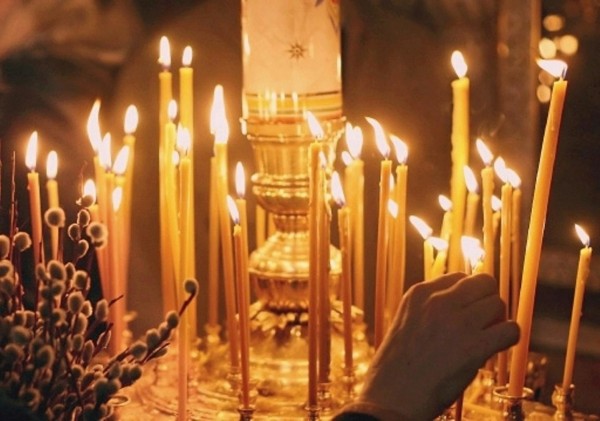I look forward to Pascha. I don’t look forward to Holy Week. It isn’t that there aren’t plenty of things in Holy Week that I find stirring and compelling every year, from Bridegroom Matins early in the week and especially the haunting and humbling exaposteilarion (“Verily I behold Thy Bridal Chamber adorned, and I possess no robe to enter thereinto”) to the singing of “The Noble Joseph” during the veneration of the shroud at Great Vespers on Friday afternoon and the rousing “dry bones” reading from Ezekiel that follows the lamentations of Holy Saturday Matins on Friday evening. The issue isn’t lack of interest in the liturgical richness of the week; it’s the daunting thought every year of the energy it will take to participate in it, or at least to participate as much as I’d like.
There’s a lot out there about the challenges today of balancing work and family commitments. Whereas in my parents’ generation, a single income was enough to purchase a house in a nice suburban neighborhood and send three children to college, the difficulties of making ends meet even in a dual-income family today are well-known, and one consequence is an increased level of all-around exhaustion, certainly for working parents. At the university where I’m employed I teach an undergraduate course entitled “Theology of Work and Rest”. In some sense, the entire framework of the course is set by Jesus’ statement “Come to me all you who labor and are heavy laden, and I will give you rest” (Mt. 11:28), that remarkable and profound invitation to take a load off. This year as Holy Week approaches once again, and insofar as coming to Jesus and coming to the services of the church in the most important week of the liturgical year are not unrelated, I’ve been wondering to myself in what sense attending the Holy Week services will entail rest, for me or my wife, Julie. It looms on the horizon more like the opposite: an additional burden to bear on top of a life already so loaded up with the demands of our jobs and of raising our children that we typically feel, by the time we put them down at the end of the day, that we’ve got nothing left.
Our move to Scranton four years ago from the area around Washington, DC has meant that at least the drive to church on weekday evenings no longer involves Beltway traffic. But this year we have the fury of our youngest, Jonathan, to contend with anytime he’s allowed less than full and free access to one of the two winding staircases at the back of our church that lead up to the choir loft. When I’m not serving in the altar, Julie and I take turns detailing Jonathan. (There’s no nursery at our parish.) The choir director and members are generous and gentle souls who smile amiably as our fifteen-month-old capers between their legs and I dash after him stooped over so as not to block their view of their music, but I naturally worry about testing their patience. When I recently read a comment of Metropolitan Hilarion of Volokolamsk, chair of the Department of External Church Relations of the Russian Orthodox Church, that because of the beauty and integrity of Orthodox divine services “two hours are never sufficient for me, since the time goes by so quickly and the dismissal comes too soon,” I had trouble remembering the last time I felt my heart sink when a church service had to come to an end.
Real, though, as the sheer physical demands are of juggling work, ordinary parenting responsibilities, and Holy Week, I’ve become increasingly aware in the last few years that my angst as the week approaches is tied up at least as much if not more with something other than the physical strain of it all. The heavier load comes from an unspoken expectation that I should be at all the services, bar none. This is an expectation that truly is unspoken: nobody has ever said it to me. I miss some services every year — not since I was single and at seminary have I had a perfect Holy Week attendance record — and always feel vaguely uneasy about missing, but what’s become clearer to me is how the anxiety about falling short of my religious commitment is itself rooted in some pretty sinful stuff. My concern is less about really falling short than about being perceived as falling short. Paul urges the Colossians to do their work not as “menpleasers” but with God in mind (Col. 3:22), an admonition that echoes what Jesus says in the Sermon on the Mount when he cautions against doing one’s praying in order to be seen by others rather than God (Mt. 6:5). I get uptight about missing Holy Week services, it turns out, because it makes me uncomfortable to know that others aren’t seeing me there, praying.
It’s true that I like being at the services, know I am enriched by them when I can go, and am sorry to miss for these reasons, but none of this leads me to get short-tempered and irritable about missing; only the sinful stuff, the worry about what others might think, does that. God knows it’s possible to miss a Holy Week service in perfectly good faith and with one’s will fully surrendered to God’s. The converse is also true — it’s possible to make a willful decision to attend, not in faith but in pride and regardless of whatever pressures it might put on spouse and children, or even on oneself in a way that then spills over onto loved ones.
Certainly it’s possible to miss church services out of mere sloth: a feeling of just not wanting to be there where, all else being equal, God has called me to be and of preferring to be somewhere else. What lies behind sloth in its genuine religious sense is what the church fathers called acedia. In an excellent chapter on sloth that I assign my students, from her bookGlittering Vices: A New Look at the Seven Deadly Sins and Their Remedies, author Rebecca DeYoung notes that a-kedeia “literally means ‘lack of care'” and that according to Evagrius of Pontus and other desert fathers, it was “a grave spiritual malady, expressed in dejection or a feeling of oppressiveness or even disgust.” (83) Much more than just laziness, acediaboils down to resistance to God’s love, which always means resistance to being transformed by God’s love. DeYoung points out, drawing on philosopher Josef Pieper, that sloth in this perspective can manifest itself, surprisingly perhaps, in the form of workaholism, insofar as I may overwork to avoid the contemplative stillness in which I can hear God. Saying yes to so many professional commitments that I find myself without room for the services of Holy Week could be a sign of a slothful preference to keep God at arm’s length.
So I’ll always have to view the “I have too much to do” reason for not attending a service with some healthy mistrust. And I’ll have to take care that an apparently more pious decision to attend, on some given occasion, isn’t driven more by vanity than love. There are those Holy Week moments where it’s all we can do to send up the simple question: God, what will please you here? Less important than the frequency of the prayer is the quality: I have to really want to know the answer. If how I ask is with my heart still subtly half-set on pleasing someone besides God — myself or other people — then my heart won’t have been prepared to receive the answer. “You ask and do not receive, because you ask wrongly,” says James (4:3), who identifies the problem as “double-mindedness” (James 4:8). The purification of heart that James says has to occur in order for this double-mindedness to be overcome is a process that God ceaselessly wills for each of us, and I pray that I’ll be open to it again this Holy Week, both when I’m in church, and when I’m not. It’s a hope that makes Holy Week something to look forward to.

















